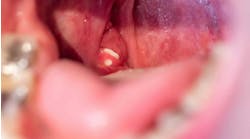by Lory Laughter, RDH, BS
[email protected]
Formal education relies on tests, and our performance determines whether we move to the next level. These tests fall into three categories: the regurgitation test, the skills assessment, and the application evaluation. While the first two tests are straightforward, the application exam requires analysis and logical thinking. Very mean instructors threw situations at us that had never even been discussed in class or addressed in the text. My memories of the gripe sessions after these tests in college are still vivid after all these years.
Even in high school, most of my classmates and I assumed the teachers who gave the dreaded application tests were just plain mean and had nothing better to do than make our lives miserable. After all, if we could repeat everything we heard or read, why should we be required to write long explanations of how those principles applied to some random condition? Memorization had served us well in the early grades; spelling and math facts were mastered by repetition and memory. It didn't seem necessary to change the rules at this late point.
When we think about analysis or critical thinking, a vision of a nerd with taped–together glasses and suspenders often comes to mind. Even the famous statue of The Thinker depicts a man experiencing some level of discomfort at his thinking task. Yet we use this valuable skill daily from an early age, whether we recognize it or not. As children, we took our requests to the parent most likely to say yes, and as maturity developed we could even determine what time of day or setting would produce the most positive outcome.
I was recently discussing decalcification and caries with a long–time patient, and her questions seemed rather pointed. My recommendation for her to use an at–home product was met with unusual resistance. Upon further inquiry she nearly shouted, “You recommended product X for my husband's cavity problem, so why are you telling me to use product A?” I'll admit I was taken by surprise and had to regain some composure before answering, but I was able to explain that each person is different and a cookie–cutter approach to health care is not appropriate. My gratitude for mean professors who insisted on torturing students with seemingly useless analytical evaluations increased that day.
Our profession is undergoing challenges that require an analytical approach. Clinical positions are scarce in many areas, duties are being delegated to those with less training, and education and organized dentistry is pushing the CDHC idea forward without regard or consideration to using RDHs for this role.
The ADA Web site states, “The CDHC works within the underserved community to provide teeth cleanings, apply dental sealants and fluoride treatments, and help educate people on the importance of brushing, flossing, and eating a balanced diet.” (http://www.ada.org/public/topics/access.asp#workforce) This definition is clearly within the scope of current dental hygiene practice, yet many states will not allow an RDH to perform these duties without some level of dentist supervision. I've heard the argument that RDHs do not want to work in the underserved areas or in public health settings. Most of us probably have several colleagues working in these exact settings now.
When perceived from an analytical position, it makes sense to allow those who are already educated perform these duties, rather than spending time and money to train new providers. Dental hygienists provide far more than the services listed by the ADA, but this cannot be perceived as negative. The ability to think critically and apply our knowledge to ever–changing situations will add value to needed treatment. The need for care is now — RDHs are ready to provide care now. Let's try a little logic!
Lory Laughter, RDH, BS, practices clinically in Napa, Calif. She is owner of Dental IQ, a company dedicated to the Annual Napa Dental Experience. Lory combines her love for travel with speaking nationally on a variety of topics.





